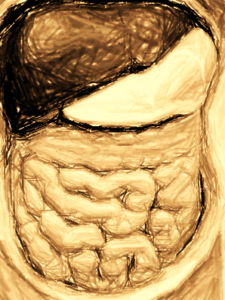Gut and autoimmunity connection
The health of digestive system is very important for people with autoimmunity problems. Our immune system is closely connected with our gut. The intestines can be compared to the roots of plants that absorb nutrients for them to grow. If the soil is poor and roots weak, the plant will be struggling to survive. Unhealthy gut has been connected to autoimmunity.
There are few factors which can benefit the health of our digestive system. These are: healthy diet, lots of vegetables (including some cruciferous ones like broccoli, cabbage, horseradish, wasabi), herbs, fiber, fermented food, limiting processed food, avoiding foods one is sensitive too (like gluten) and avoiding stress. Frequent use of antibiotics and some other medications (like steroids, NSAIDs- aspirin, ibuprofen and others ) can also affect the balance of bacteria in our gut and promote imbalances with a loss of beneficial bacteria. Antibiotics and some other medications can damage the lining of our intestines. Frequent infections may also have a negative effect. Hormonal balance is also very important for gut health. Imbalance of thyroid hormones for example may lower the stomach acid, digestive enzymes and bile and change the time food travels through the digestive system, ultimately causing an imbalance in gut bacteria, nutrient deficiencies and health issues.
The gut flora consists of over 500 species of bacteria (Firmicutes/Bacteroidetes most common), fungi and viruses. Beneficial bacteria help to digest food, absorb and make vitamins (B and K2), help to metabolize hormones and other chemicals (such as short-chain fatty acids used for energy by our body) that keep our body healthy and our immune system balanced. They help to remove toxic heavy metals (6, 7). Lactobacillus strains were found to be able to absorb and remove cadmium from culture mediums in a study (8). Cadmium toxicity has been implicated in thyroid autoimmunity.
We live in a symbiotic relationship with our gut microflora as it interacts with the cells of the intestines. The live microorganisms in our gut interact with our nervous system and our immune system as well, they can induce a production of certain immune-regulatory molecules which are also absorbed by our intestines. Balanced gut flora can help the immune system not to over-react. Most of our immune system is associated with our gut. Serotonin, happy molecule is produced predominantly by our gut. Beneficial microorganisms in our gut protect our body from bad, pathogenic organisms. If there is imbalance of gut flora and ‘bad’ inhabitants predominate over ‘beneficial’ inhabitants, the nervous system and the immune system of an individual will be affected. Some bacteria can influence our mood for the better, there is a saying healthy gut, happy person. It was found in animal study (2) that Lactobacillus rhamnosus (beneficial bacteria) in our gut can reduce anxiety by producing molecules which directly interact with our brain. Interestingly, Lactobacillus species can be depleted by overgrowth of Candida yeast. Even though having some Candida in the gut is normal, overgrowth can be a problem. Many people with autoimmunity may have imbalances in their gut microbiota (dysbiosis). An example of that is the lack of Lactobacillus or Bifidobacterium species in the gut. As mentioned before, lack of Lactobacillus can make a person more anxious. Different bacteria can have a specific effect on our body, for example Styreptococcus thermophiles may improve lactose intolerance.
Low stomach acid may play a havoc with the balance of bacteria in the digestive and immune system. Low stomach acid may be seen with thyroid hormonal imbalance and stress. Low stomach acid may allow harmful bacteria like H. pylori to survive (this bacteria may cause stomach ulcers). Low stomach acid is connected to a poor absorption of minerals and vitamins. This then causes loss of essential nutrients. Eating processed packaged food and food with preservatives (after all, preservatives do not allow bacteria to reproduce) will affect our gut flora. Diet high in sugar, high carbohydrate diet, predominantly wheat flour based products, fatty food, low in vegetables, fiber and low in fermented food and essential fatty acids can lead to an unhealthy gut. One more reason for imbalanced gut flora is stress. Stress activates the sympathetic nervous system in place of parasympathetic nervous system which is responsible for proper digestion of food. We cannot also forget about vitamin D which is absolutely vital for people with autoimmunity as it activates pathways to make antibacterial molecules which are designed to kill harmful bacteria in our gut and generally in the body. Vitamin D balances the immune system. Frequent use of some medications like the anti-inflammatory NSAIDs, steroids and antibiotics negatively alters the gut microbiota. High consumption of alcohol also alters the balance of bacteria in the gut.
Complete stool analysis test can determine the health of the digestive system, digestion and gut health. This test is generally requested by the integrative medical doctors so that the specific problems can be rectified. If you have bacterial gut imbalance (or parasites), you might be given specific probiotics or herbal remedies by your holistic doctor (such as those containing oregano, thyme, licorice, slippery elm, marshmallow root, olive leaf, garlic and other herbs) to correct the problem. If you have digestive problems, HCl-betaine (for a low stomach acid) or enzymes may be prescribed.
Gas, burping, bloating, heartburn, constipation, diarrhea, indigestion would be the obvious signs that there is something wrong with your digestion. However other signs can be allergies, itching and anxiety. Therefore, signs of gut microbiota imbalance can be difficult to recognize. Obviously if you suffer from thyroid problems, have imbalanced of deficient hormones, the digestive system will not work well. It is common problem with hypothyroidism. I had poor digestion and stomach ulcers as a direct consequence of being on sub-optimal thyroid hormonal treatment. Personally, I saw a great improvement in my gut health by adding NDT to my levothyroxine hormonal replacement, making sure my hormonal balance was the best I could achieve. My integrative medical doctor put me on a quality probiotic for a month.
Fermented food can help to balance gut bacteria (such as sauerkraut, other fermented vegetables). Eating organic, non- processed and non-preserved food can help. Soluble fiber was found to benefit intestines (found in oats, beans, lentils, peas, flax seeds, other seeds and some fruits and some vegetables). Supporting your adrenals, good sleep, rest and relaxation can help with stress and limiting frequent infections requiring antibiotics. Some people find colostrum beneficial for balancing their gut flora. Apple cider vinegar also helps to re-balance the gut. Hormonal balance is also very important. The health of the gut can be achieved back through a healthy diet, fermented foods, probiotics, herbal remedies, improving digestion with specific supplements (glutamine), avoiding food one is sensitive to, balancing hormones and limiting stress. Glutamine is great for a leaky gut but some people should avoid it, especially if they get more nervous after taking glutamine and in specific conditions) so consult your doctor regarding glutamine. I personally took glutamine supplement for a month (1 tsp) per day to improve my gut. The positive steps you will take in the direction of your gut health, can greatly benefit your overall health and help with autoimmunity problems.
This post in for educational purposes only. Consult your doctor/ health practitioner if you experience any digestive and gut issues and regarding any supplements and remedies.
References:
- Eamonn M. M. Quigley, MD, FRCP, FACP, FACG, FRCPI. Gut Bacteria in Health and Disease. Gastroenterol Hepatol (N Y). 2013 Sep; 9(9): 560–569.
- Javier A. Bravo, Paul Forsythe, Marianne V. Chew, Emily Escaravage, Hélène M. Savignac, Timothy G. Dinan, John Bienenstock and John F. Cryana. Ingestion of Lactobacillus strain regulates emotional behavior and central GABA receptor expression in a mouse via the vagus nerve. Proc Natl Acad Sci U S A. 2011 Sep 20; 108(38): 16050–16055.
- Candida and Gut Dysbiosis. URL:http://www.ei-resource.org/illness-information/environmental-illnesses/candida-and-gut-dysbiosis/
- Geraldine O. Canny and Beth A. McCormick. Bacteria in the Intestine, Helpful Residents or Enemies from Within? Infect Immun. 2008 Aug; 76(8): 3360–3373.
- Françoise Rul, Leila Ben-Yahia, Fatima Chegdani, Laura Wrzosek, Stéphane Thomas, Marie-Louise Noordine, Christophe Gitton, Claire Cherbuy, Philippe Langella, and Muriel Thomas. Impact of the Metabolic Activity of Streptococcus thermophilus on the Colon Epithelium of Gnotobiotic Rats. J Biol Chem. 2011 Mar 25; 286(12): 10288–10296.
- S Salminen, et al. Probiotic bacteria as potential detoxification tools: assessing their heavy metal binding isotherms. Can J Microbiol. 2006 Sep; 52(9):877-85.
- JN Bhakta, et al. Characterization of lactic acid bacteria-based probiotics as potential heavy metal sorbents. J Appl Microbiol. 2012 Jun; 112(6):1193-206.
- Anna V. Kirillova, Anna A. Danilushkina, Denis S. Irisov, Nataliya L. Bruslik, Rawil F. Fakhrullin, Yuri A. Zakharov, Vladimir S. Bukhmin, and Dina R. Yarullina. Assessment of Resistance and Bioremediation Ability of Lactobacillus Strains to Lead and Cadmium. International Journal of Microbiology. 2017. URL: https://www.hindawi.com/journals/ijmicro/2017/9869145/

